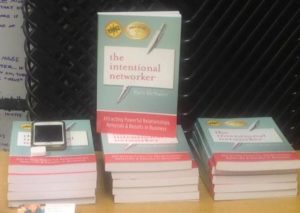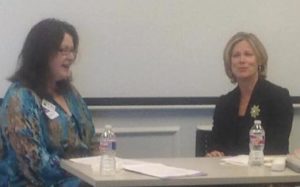For years, I’ve pondered writing a book. Now that I’m launching a speaking career next month at SXSW Interactive , I decided now was the time to hunker down and do it. Since writing a book is my No. 1 goal for 2016, I was intrigued to receive an email about Freelance Austin’s February meeting featuring Patti DeNucci’s publishing journey. DeNucci is the founder of Freelance Austin, award-winning author of The Intentional Networker, and a professional speaker. During February’s meeting, she shared her perspective of what it takes to be successful. Here are a few of the main takeaways for those who missed it.
, I decided now was the time to hunker down and do it. Since writing a book is my No. 1 goal for 2016, I was intrigued to receive an email about Freelance Austin’s February meeting featuring Patti DeNucci’s publishing journey. DeNucci is the founder of Freelance Austin, award-winning author of The Intentional Networker, and a professional speaker. During February’s meeting, she shared her perspective of what it takes to be successful. Here are a few of the main takeaways for those who missed it.
1.The timing of life events can drive one’s dedication to begin the process.
DeNucci always knew she had something special to share with the world, but she was busy managing her own business and raising a family. It wasn’t until her father was on his deathbed that she realized she needed to appreciate his legacy and offer her own. Although it was painful to lose him, she knew it was time to take her message and experiences to the masses
2. Have an idea living inside you? Start with a chapter.
You don’t have to write the entire book before you start the publishing process. First ask yourself if there’s a topic burning inside. If so, start there. If you haven’t fully developed your concept, get a journal and jot down random thoughts. Start collecting articles, quotes, and passages from books, and organize topics into “buckets.” Before you know it, you’ll have an outline of tangible ideas and you can form a writing strategy.
3. Make sure to do a gut-check upfront.
Ask yourself key questions like:
- What unique perspective do I have?
- What do I want to say?
- What are my niche skills and one-of-kind experiences?
- What creative expression do I uniquely have?
- How do I want to change the world?
- Who will care to read my book?
No matter what, be 100 percent yourself. Focus on finding your own authentic voice and point of view, and express it freely.
4. Don’t obsess on the title of the book.
For DeNucci, she focused on the content of her book first. Toward the end of the process, in a magical moment, the title came to her as if the sky opened up and delivered a message to her personally.
magical moment, the title came to her as if the sky opened up and delivered a message to her personally.
5. Understand the different publishing options.
DeNucci made the decision to self publish. She wanted creative control of the intellectual property, so she formed her own publishing company. This allowed her the option to hire a team and direct the entire process.
6. Realize that your team will be your backbone.
DeNucci believes much of her success during the process is due to having a rock star team to support her vision and efforts. Her team comprised of:
- Publishing strategist
- Editor
- Designer
- Proof reader
- Publicist
- Author’s assistant
- Indexer
7. Accept the realities of the financial commitment when publishing a book.
DeNucci was quite candid about her financial investment in publishing her book. In reality, she didn’t expect to make big bucks, but did see her book as a “passport” to other career opportunities, like professional speaking engagements. On average, it’s essential to have at least $10,000 to $30,000 on hand to make your dream of a printed book a reality.
8. The best way to learn about publishing is to study it.
DeNucci encouraged us to do our homework. Sign up for workshops, watch videos, study the components of our favorite books and much more. Since the publishing process is quite complex, she suggests we do what we can to learn about everything involved. This will give you greater confidence and mitigate risks whenever possible.
9. “If you court the muse, the muse will court you back.”
DeNucci didn’t have a formal process when writing her book, but she did work closely on deadline. Meeting with her publishing strategist monthly kept her accountable and ensured she received feedback to keep her moving forward. Often she would get in her zone, write for hours on end and suddenly lose track of time. That was when she was courting her “creative muse” and finding her groove.
10. Your topic can evolve into something much greater than the original idea.
Writing is an organic process, so the content will evolve based on a variety of factors. Keep an open mind and realize the road to authorship is full of surprises — including where your career may take you next.
Since meeting DeNucci and learning from her wisdom, I’ve watched three 30-minute videos about publishing, I’ve written at least one book chapter and I have a call scheduled with a self-publishing arm of a major publisher. To say DeNucci ignited a fire within me is an understatement and I’m putting her suggestions into action. So for that, I’m forever grateful.
- Top 10 Takeaways on Book Publishing: February Meeting Recap - February 26, 2016
